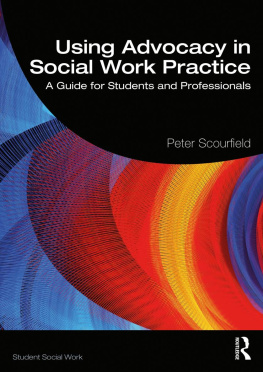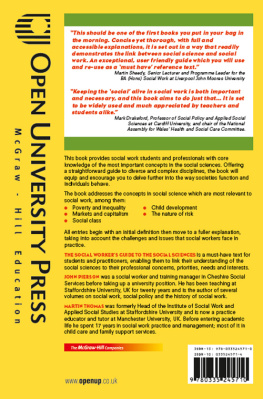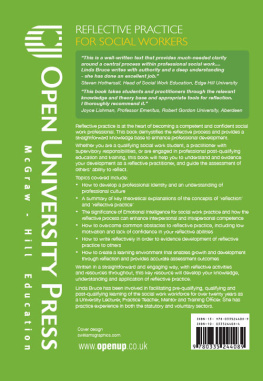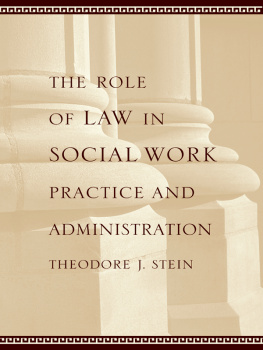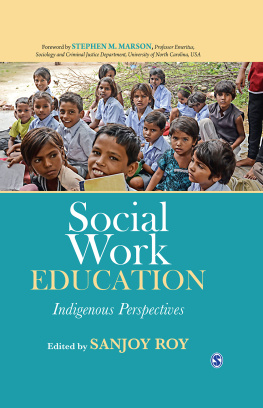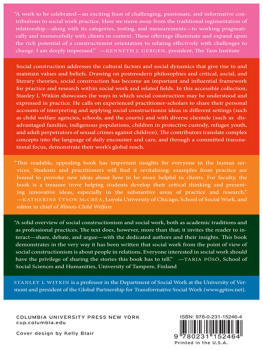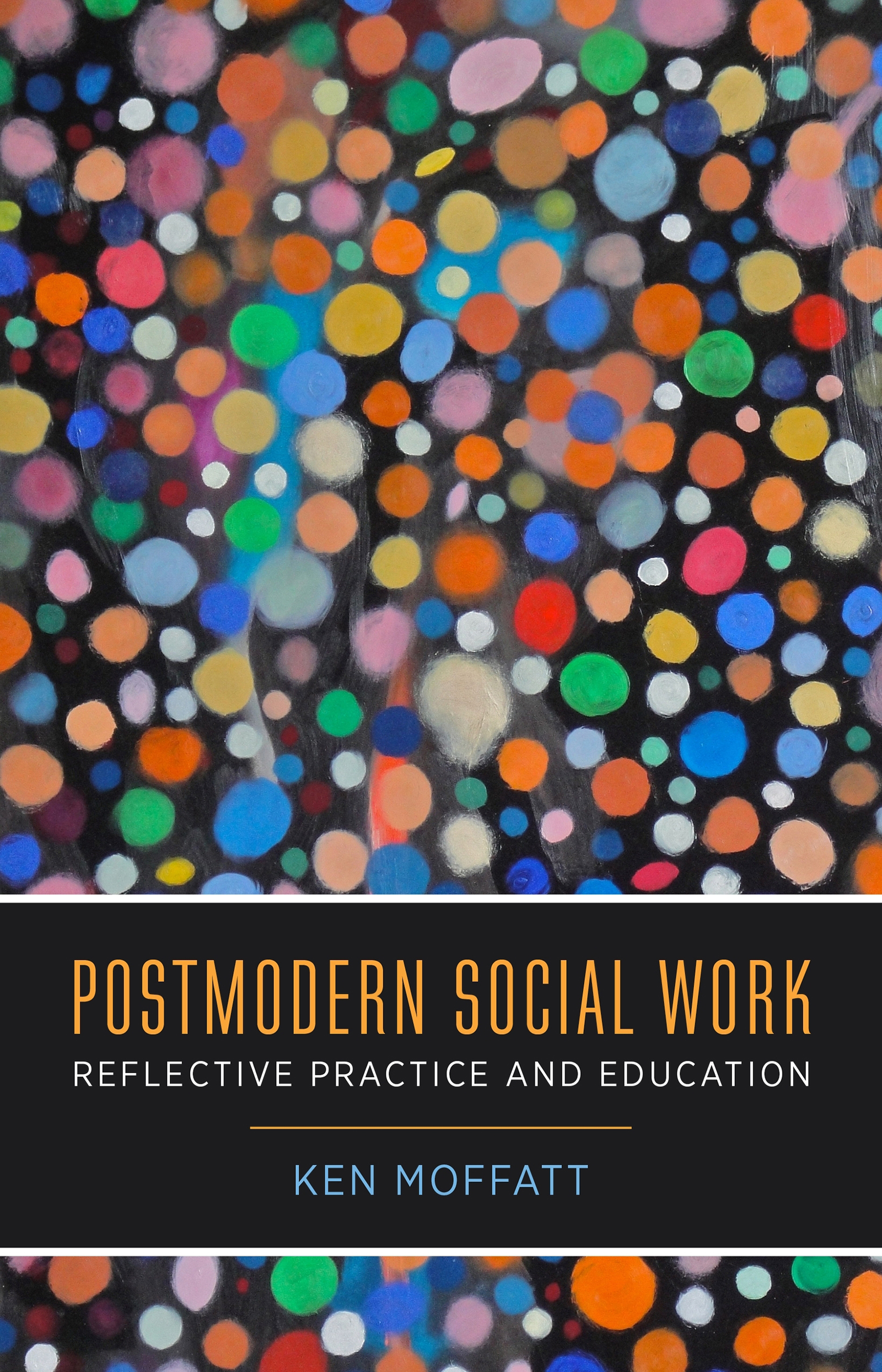Contents
Guide
Pagebreaks of the print version
POSTMODERN SOCIAL WORK
POSTMODERN SOCIAL WORK
Reflective Practice and Education
KEN MOFFATT
Columbia University Press New York

Columbia University Press
Publishers Since 1893
New YorkChichester, West Sussex
cup.columbia.edu
Copyright 2019 Columbia University Press
All rights reserved
E-ISBN 978-0-231-54939-4
Library of Congress Cataloging-in-Publication Data
Names: Moffatt, Kenneth James, 1952 author.
Title: Postmodern social work ; reflective practice and education / Ken Moffatt.
Description: New York : Columbia University Press, [2019] | Includes bibliographical references and index.
Identifiers: LCCN 2019003079 (print) | LCCN 2019004775 (e-book) | ISBN 9780231128001 (hardback) | ISBN 9780231128018 (trade pbk.)
Subjects: LCSH: Social work education. | Social servicePractice.
Classification: LCC HV11 (e-book) | LCC HV11 .M585 2019 (print) | DDC 361.3/2dc23
LC record available at https://lccn.loc.gov/2019003079
A Columbia University Press E-book.
CUP would be pleased to hear about your reading experience with this e-book at .
Cover design: Elliott S. Cairns
Cover image: Ocelot (detail), FASTWRMS, 2010. Oil on canvas, 36 48 inches.
CONTENTS
A number of people have been key to the success of this book through their ongoing support and encouragement. I wish to thank Allan Irving, Scott Telek, Sandy McLeod, Patrick deCoste, Keith Cole, R. M. Vaughan, Jennifer Prest, Michael La Sala, Cristina Guadalupe, Nick Dangerfield, Sarah Todd, Lisa Barnoff, Sean Ferkul, and Julian Calleros.
Parts of this book were presented and workshopped at Blue Water Residency, Ontario Canada; Anima Casa Rural, San Isidro Mazatepec, Mexico; and the Doctoral Program at Rutgers University School of Social Work, New Jersey, United States.
S ocial work education has long been a field in which practitioners theorize ambivalence and change. The comfort level with open process among social work practitioners is more valuable than ever in the contemporary context, which is defined by the speeded-up processes of capitalism and the onslaught of omnipresent technologies. In this book, I explore two broad contemporary interests for social work education. First, I consider a range of influences from technology, neoliberalism, and global capitalism. Second, I discuss the possibilities of a reflective approach to theory and practice. Reflective practice allows one to deal with the shifting landscape that results from constant change while staying true to social works central concerns. Through reflective practice, social workers can integrate attachment, social welfare, and social justice into direct practice.
This book consists of a series of interlocking essays focused on the theoretical underpinnings of reflective practice in the context of social work education. The book is distinguished by its focus on postmodern theory to elaborate the literature of reflective practice. Each chapter illustrates key postmodern concepts that are relevant to reflection. Throughout the book, my focus shifts between broad social, political, and economic influences and the specifics of personal insight and interpersonal interaction.
Since social work is focused on direct human contact, it is a professional field of practice that is particularly well poised to deal with the continued onslaught of technological and corporate influences in human affairs. Increasingly, technique and technology are central to contemporary communication and the construction of social relationships. Most social interactions are either driven by data or mediated through technology. In addition, social relationships and approaches to social welfare are increasingly imagined through, as well as constrained by, technological forms of communication. An approach to practice that is reflective rather than focused on technically mediated communication allows one to focus on direct experience. Reflective practice also allows one to think about how we make ourselves present in the social context rather than simply responding to external factors such as media and technology.
A strength of the social work field is its focus on the aesthetics of lived experience, which runs counter to technological reductive thinking and abstract generalizations about people. Reductive thinking involves capturing all human processes, no matter how complex, to the smallest measures. Abstract generalization explains phenomena in categories that are meant to be applicable to all human interaction without reference to lived experience and social context. By drawing on the social work practice tradition based in reflection, educators can address the troubling aspects of the rise of reductive and abstract approaches to social welfare by remaining focused on the complexities of process and direct experience. Through a postmodern reflective approach, I hope to make lived experience central to reflection about our pedagogical experiences.
There is a rich literature focused on reflective practice in social work, including clinical and direct practice (Bres, 2014; Bres, Bowles, and Fook, 2011; Fook, 2016; Fook and Askeland, 2007; Fook and Kellehear, 2010; Hyatt, 2014; Mandell, 2007; Miehls and Moffatt, 2000), community practice work (Barnoff and Moffatt, 2007; Burstow, 1991; Harms Smith and Nathane-Taulela, 2015; Lee, 1999; Lee, McGrath, Moffatt, and George, 2002; Moffatt, U. George, Lee, and McGrath, 2005; Parada, Barnoff, Moffatt, and Homan, 2010; Willson, 2018), postmodern approaches to reflection (Bres, 2012; Chambon, 1994, 1999; Donovan, Rose, and Connolly, 2017; Healy, 2005; Healy and Leonard, 2000; Irving, 1994, 1999, 2014; Irving and Young, 2002, Morley, 2014; Phillips, 2007; Ungar, 2004), arts-based reflection (Barnes, 2015; Chambon and Irving, 2003; R. Jackson, Debassige, Masching, and Whitebread, 2015; Moffatt, 2012a; Paton, 2015; Sinding and Barnes, 2015; Trevelyan, Crath, and Chambon, 2012; Wehbi, 2015; Wehbi, McCormick, and Angelucci, 2016; Wehbi, Preston, and Moffatt, 2016; Wilson et al., 2016), critical approaches to reflection (Fook, 2016; Heron, 2005; Martinez-Brawley, 2001; Martinez-Brawley and Zorita, 2007), and social-constructionist reflective approaches (Fook, 2014; Gardner, 2012; M. Keenan, 2012; Kumsa, 2012; Witkin, 2012a, 2014b).
Reflective social work practice defies simple categorization since reflection involves complexity. For example, the work of Irving (1999, 2014) is not easily contained within the categories of postmodern, social-constructionist, or arts-based approaches to social work knowledge and practice. Barnes (2015) approaches reflective practice in a manner that includes direct practice, community practice, and arts-based approaches. R. Jackson et al. (2015) build on narrative reflexivity as a form of culture building, as well as a method to discuss colonization, indigenous knowledge, and the arts. I build on this strong interdisciplinary social work literature to discuss reflection in the postsecondary social work classroom and to think through practice approaches.
Postmodern social work invites us to rethink the traditional social work categories of clinical, community, and policy practice. Instead, postmodern frames of reference for social work allow one to explore concepts of practice that defy categories based on level of practice. For example, concepts such as self, power, discourse, subjectivity, consciousness, affect, and emotions are both individual and social in nature. Throughout the book, I provide a conceptual postmodern frame for reflective practice by elaborating on concepts such as self, power, discourse, history of the present, tacit knowledge, psychic space, subject in process, ascesis, the planar, assemblage, and rhizomatic change . Philosophers I draw on in the book include Zygmunt Bauman, Judith Butler, Michel Foucault, Julia Kristeva, Gilles Deleuze, and Flix Guattari, who are loosely grouped in the canon of postmodernism.


